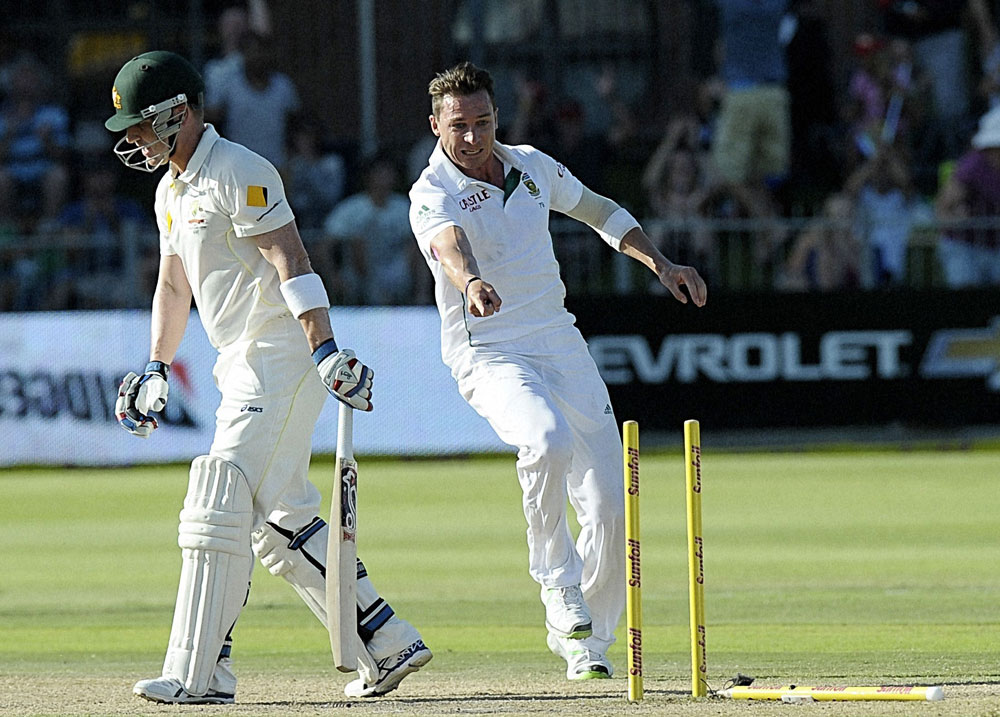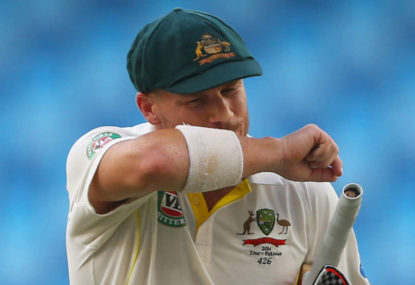Australia is set to face Test cricket’s best current-day fast bowling arsenal.
South Africa boasts a depth in its pace attack that is presently unmatched.
It is led by a man who could well end his career as the greatest quick of all time.
Dale Steyn has terrorised batsmen around the world over the past 12 years.
At 33, and with 84 Tests behind him, he is entering the twilight of a glittering career which has produced 416 wickets at the miserly average of 22.2. His strike rate of 41.3 is the best of any bowler to have taken over 120 Test wickets.
While his pace may have diminished from his pomp he still bowls at a healthy clip and retains his ever threatening out-swinger.
He will be backed-up in this series by Vernon Philander, Morne Morkel and Kagiso Rabada.
Philander made his debut against Australia at Cape Town in 2011 where his 5-15 in the second innings was the main driver in the visitors’ being bowled out for just 47.
Since then his medium fast bowling and ability to bowl long and relentless spells has netted 130 wickets at 22.1 from 34 matches.
Morkel, at 1.96m, combines pace with steepling bounce. His 71 Tests have produced 242 wickets at 29.3.
During the last series between the two sides in 2013-14, Morkel produced one of the most hostile spells in recent times when he peppered Michael Clarke with short balls at Cape Town.
Rabada is easily the youngest of the Proteas’ pace quartet but he has already shown he is a potential leader of the attack in the coming years.
At just 21, he has already claimed 29 wickets at 24.4 from eight Tests.
Collectively, South Africa’s pace arsenal will be a handful.
Dulling it, let alone overcoming it, will prove a major challenge for Australia’s top order.
In the pre-series phony war, Steyn has already singled out the scalps of skipper Steve Smith and his deputy David Warner as the main focus of the Proteas’ attack.
Since assuming the captaincy Smith has been prolific with seven centuries and an average of 74.2 – 13 of his 24 innings have resulted in scores of 50 or more.
It is not surprising that Steyn has identified him as a major threat. In doing so he invoked the old West Indian theory that if you remove the head the snake will die.
But for mine, it is Warner who is the key to Australia’s prospects.
South Africa has suffered at his hands more than any other side in the world.
In the last of his six Tests against the Proteas – at Cape Town in March 2014 – he peeled off a century in each innings with knocks of 135 and 145.
In the two preceding matches he scored 12, 115, 70 and 66 for a man-of-the-series winning 543 runs at 90.5.
Australia won the series 2-1 with Warner’s tons coming in both the Tests that the side won.
Warner has a fourth century against South Africa – 119 in his first Test against them at Adelaide Oval in November 2012.
He and his team will be keen to see him replicate his past heroics against the Proteas.
When he faced the media two days ago and was asked to respond to Steyn’s comments he played a very straight bat, refusing to return fire.

It was a sign of the more mature player that Warner has become.
While it can never be argued that he has morphed into a choir boy, the one-time team provocateur has mellowed.
A father of two who turned 30 last week, Warner has been more inclined in recent times to let his willow do the talking, and when on song, his bat speaks in a loud voice.
His swashbuckling style can unsettle opposition bowlers and have them collectively on the back foot. He needs to bring that approach to the table during this series.
He remains one of the game’s purest hitters and he needs to back himself in that regard throughout the summer.
Warner will be licking his lips with a return today to the WACA Ground as the venue has played host to his two best Test scores – 253 last season against New Zealand and a 159-ball innings of 180 against India in January 2012.
When Warner goes big he does it a rapid rate. His career strike rate is 77.3. The collective strike rate in the 16 innings in which he has scored a century is 86.2, indicative of how he can wrest the initiative from the bowlers.
At his energetic best Warner can cause despair for opposing skippers with his ability to access most areas of the ground.
A rapid-fire, well-executed innings from Warner will set the tone for the Aussies against a classy attack.
If he flourishes the entire team will walk taller.






























































































